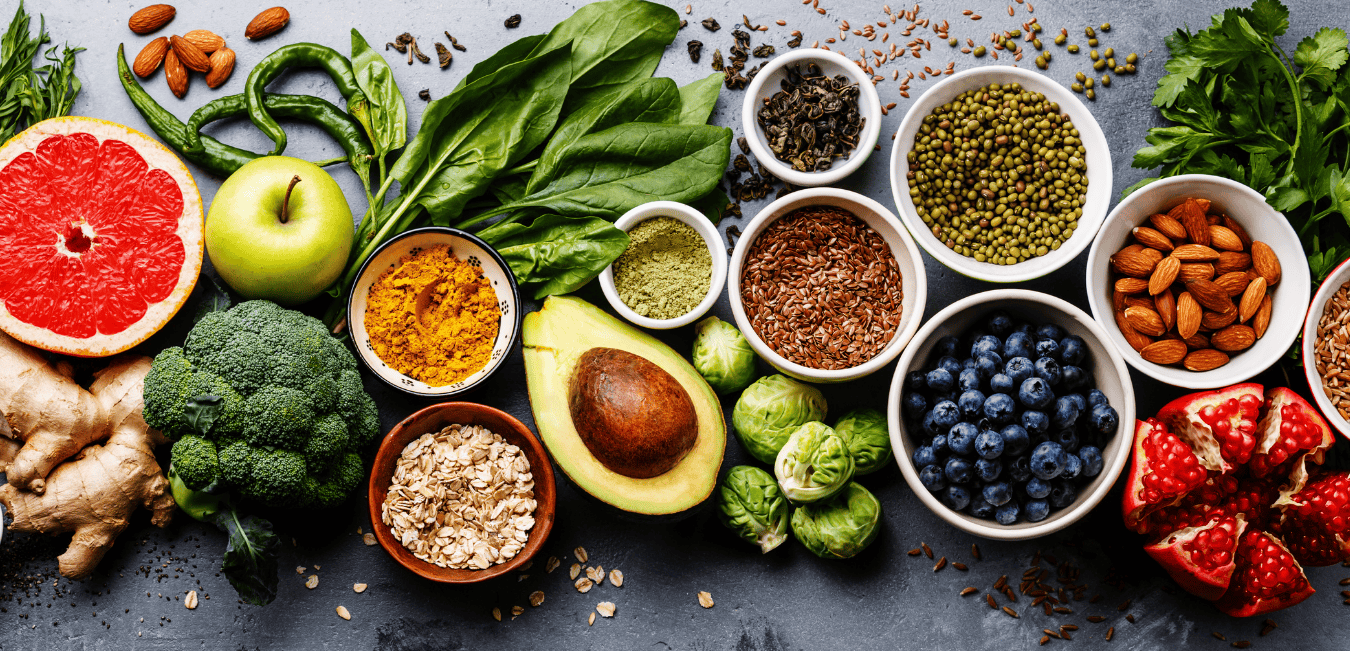Parents, you may relate to the feeling of overwhelm when walking down the supplement aisle in your favorite health food store. You already work hard to prioritize a healthy lifestyle for your family, but in today’s world of information overload and hundreds of supplements right at your fingertips, you may be repeatedly asking yourself, “Does my child really need this product?” To be honest, the answer isn’t so black and white.
You’ve heard that food is medicine, and that is true to an extent. There are hundreds of important nutrients in foods like vitamins, minerals, proteins, fats, carbohydrates, and other phytonutrients (plant nutrients) that are essential for health and longevity. In fact, more than 8000 plant compounds have been identified in various plant species (1), and that’s just what the research has been able to label!
As a parent, making sure your child is getting adequate amounts of certain nutrients is key as it plays a direct role in supporting their normal growth, development, and healing. This article covers the major differences between food and supplement, some cases when supplementation is necessary, and my doctor-approved tips on choosing top-quality supplements for your family.
The Benefit Of Getting Nutrients From Food
Humans, by evolutionary design, can obtain all the nutrients that we need from the food available to us. In my opinion, we’ve never been able to make a synthetic supplement that is superior to an organically growth, healthfully prepared, and thoroughly enjoyed meal. That’s because, even if we perfectly duplicated all the vitamins, minerals, and other major nutrients found in a healthy diet, we could have a clumsy caricature at best.
You see a healthy diet provides so much more than a full assortment of vitamins, minerals, fats, protein, and carbohydrates. There are also plant and animal based cofactors which enhance absorption of key elements; there are pre- and probiotics which are specific to the environment in which the food was grown; there are health-promoting phytonutrients; there are nutrients and health benefits that are as yet undiscovered.
Beyond the nutritional benefit, there are also benefits that come with the important acts of seeking, preparing, eating, and sharing a meal. These everyday actions play important roles in our mental health, our overall well-being, our connection to our families, and even to our physiology. Preparing to sit down and eat a meal starts our digestive processes before we even pick up a utensil. Tasting our food sends important signals to our brain to let us know how to regulate our appetite and orchestrate our hormones. Chewing provides important sensory input to help regulate our nervous systems. Sharing food, cooked with love, strengthens our bonds with the family and friends at our table. Food can enhance our relationship with our environment, our community, and our culture.
It is my strong belief that getting nutrients from food is preferable when this is possible. However, there are times when the nutrients that we can reasonably get from food don’t quite meet our needs.
Can We Get All The Nutrients We Need From Food?
As discussed above, humans, like all animals, were perfectly evolved to seek, eat, digest, and absorb everything that they need to survive and thrive from the food available in the environment. Unfortunately, over the past few generations, there have been major changes to human health and the food that is available resulting in higher nutrient requirements and lower nutrient content in our diets. That means that sometimes it simply isn’t possible for all of us to get every nutrient we need through diet alone. When that happens, our bodies’ nutrient levels can become suboptimal and even deficient.
When considering if your diet is supplying all essential nutrients, a check-in with a nutritionist or naturopathic doctor is a great option. If you’re looking for a more DIY version, I find apps like MyFitnessPal and Cronometer can help with tracking all the major nutrients. (These aren’t affiliate links; I just find these apps helpful for myself and my patients.)
Here are some of the changes to our heath and environment that contribute to nutrient deficiencies:
- Farming practices have reduced the quality of food that is available to us due to reduced soil quality, GMO foods, and more (2).
- Government policies often make less healthy food cheaper than healthy food in America causing a cultural shift in diet towards nutrient void foods and convenient processed foods rather than traditional diets based on whole foods. This includes food deserts with lack of markets and grocery stores with fresh unprocessed foods (3).
- Digestive concerns have skyrocketed to affect more than two-thirds of the US population. When the digestive tract is compromised, the absorption of nutrients suffers.
- Climate change causes downstream effects on the quality of and access to food. Food is overall less nutritious with lower levels of minerals like iron and zinc, lower in protein content, and increased carbohydrates in most plant-based foods (4).
- Modern life contains all manner of stressors that our ancestors didn’t contend with. These stressors increase the nutrient demands of our bodies, which may not be met solely through diet.
What Role Do Nutrient-Dense Superfoods And Herbal Medicines Play?
One potential strategy to prevent nutrient deficiency is to choose nutrient-dense superfoods and nutritive herbs to bolster our nutritional intake while avoiding nutrient poor foods. A diet bolstered with nutrient-dense superfoods and nutritive herbs is much more likely to provide you with the full spectrum of nutrients required for thriving good health.
When we think of nutrient-dense foods, I’m referring specifically to foods that have a robust amount of vitamins, minerals, fiber, lean protein, and/or healthy fats. On the other hand, in botanical medicine, plants that can fill “nutritional gaps” in our daily diet are referred to as nutritive herbs because they are rich in vitamins, minerals, and other plant compounds (5).
My Top Nutrient Dense Foods
Avocadoes, berries, chia seeds, broccoli sprouts, eggs, garlic, Kefir/yogurt, lentils, olive oil, pomegranate, salmon, broccoli, beef liver, watercress, and walnuts are nutrient powerhouses!
 You can play around with introducing some of these foods to your kiddo. I like to blend them into a smoothie or pasta sauce or add them to soups and stews.
You can play around with introducing some of these foods to your kiddo. I like to blend them into a smoothie or pasta sauce or add them to soups and stews.
My Favorite Nutritive Herbs
Nettles, slippery elm, milky oatstraw, lemon balm, holy basil, rosehips, chickweed, dandelion, spearmint, dill, and ginger are extremely nutritious.
A well-rounded diet supported with nutrient dense foods and nutritive herbs can serve as a reasonable maintenance strategy for adults & kiddos, assuming digestion is optimal.
Check out my nutrient dense superfood supplement Grass Fed & Finished Beef Liver Capsules and my nutritive herb formula for all ages: USDA Organic Nature’s Nutrients™ (Infants, Kids & Adults).
When Is Supplementation Necessary?
Nutrients can be used as medicine, but this requires higher doses than can usually be found in food. Sometimes nutrient dense foods & nutritive herbs aren’t enough. In my clinical practice and in my own family, I find that supplementation might be necessary in the following cases (6):
- Nutrient deficiencies can be difficult to correct through diet alone and often require supplementation.
- During times of stress and sickness, it’s difficult to get enough nutrients because of increased physical demands and decreased time and energy to focus on food.
- When digestion isn’t optimal, supplementation can help keep nutrient status up.
- If your family or your child follows a vegetarian, vegan, anti-allergic, or otherwise restricted diet, then that has the potential to lead to nutrient deficiencies.
Modern life is busy. Supplementation can help relieve some of the burden of planning and preparing “a perfectly nutritious” diet everyday. To learn how to create a supplement protocol for your family, see: How To Create A Daily Supplement Protocol For Your Family – Dr. Green Mom.
How To Choose A High Quality Supplement
Now that you’ve read why supplementation may be necessary, it’s also important to know how and where to find the best supplement for your kiddo. As mentioned, supplementation is helpful for correcting nutrient deficiencies, supporting the body through stress or illness, treating certain conditions, and for getting optimal (rather than sufficient) levels of nutrients for maximum health and vitality. When choosing a supplement, keep the following considerations in mind:
1. Form of nutrient in the supplement
Some forms of vitamins and minerals are more absorbable and better tolerated than other forms. While this topic deserves its own article, here are some common examples of popular supplements for kids that you should be on the lookout for when reading labels:
- Vitamin D: Has 2 forms – vitamin D2 (ergocalciferol) and vitamin D3 (cholecalciferol). Cholecalciferol is the body’s preferred form of vitamin D and is better at boosting levels in the body.
- Vitamin C: Ascorbic acid is the most common form of vitamin C out there and works well on its own. However, I like to look for a complete vitamin C complex of ascorbic acid, bioflavonoids (plant nutrients), and/or herbal support with rose hips or acerola cherry to increase absorption & activity.
- Magnesium: Magnesium oxide is in many generic supplements but can cause tummy upset and bloating. I suggest a magnesium glycinate/magnesium bisglycinate chelate to help lower side effects; it is highly bioavailable.
- Zinc: Many forms of zinc exist on the market today. Zinc glycinate chelate is tummy-friendly and would be the best suited for supplementation.
- Vitamins B9 and B12: Look for biologically active forms with methylfolate (L-5-MTHF) and methylcobalamin for enhanced absorption.
2. Dose of the nutrient in the supplement
Dosing is really important for proper therapeutic effect of natural medicines, including nutrients. Fish oils are the worst offenders for improper dosing! In general, you want at least a gram of omega 3 fatty acids (EPA+DHA) to get a good therapeutic effect. I’ve seen low quality fish oils that will say a capsule contains 1 g of fish oil, but with only 100 mg or less of EPA+DHA. If you’re taking one of these supplements, you’re only getting 10% of an effective dose, no results, and probably fishy burps.
3. Formulation of the supplement
Some nutrients need to be taken with others in order to work optimally. For example, piperine from black pepper can enhance the bioavailability of curcumin from turmeric and are often combined in supplements. Additionally, certain nutrients, like vitamin D, are better absorbed in a liquid form than in a traditional vitamin pill. Supplements should be formulated by someone with deep and broad expertise in natural health that understands these various factors.
4. Bioavailability
The form of the nutrient in the supplement affects bioavailability (how available the nutrient is to your body) as well as the way the supplement is made. Low quality supplements are infamous for not fully breaking down in the digestive tract, which means that the pill (and all the nutrients it contains) goes right out with your bowel movements! Liquids, powders, capsules, and easily broken down tablets are the way to go.
5. Fillers & allergens
To make dosing make sense, supplements are mixed with fillers so that they fit nicely into pills and/or taste palatable (if they are liquids or powders). It’s just as important that the fillers that you’re taking are high quality and aren’t going to cause you side effects. Allergens like gluten and dairy are often hiding in supplement fillers.
6. Quality of supplement
Choosing a quality supplement that has been thoughtfully designed, ethically made, and thoroughly tested is key. Ensuring your supplements do not contain heavy metals, microbes, or pesticides like glyphosate, are all important considerations when choosing a supplement for your family.
7. Company Transparency
A 2022 study analyzed 30 immune health dietary supplement products available on a popular online shopping website. The researchers found that 17 of the 30 products had inaccurate labels, 13 were misbranded, and 9 had additional components detected but not claimed on the label (7). As a consumer, it’s your right to know that what you’re buying is stated on the label so that you’re not being misled and that there is transparency of products being third-party tested for purity & potency.
Summary
The answer the question posed by this article: is it better to get nutrients from food or from supplements, isn’t straightforward. When health is optimal and nutrient-dense food is easily accessible, then I believe that it is better to get nutrients from food, with support from superfoods, herbs, and whole-food supplements if needed.
However, modern life is busy and often stressful; many of us live in areas where accessing healthy food isn’t always easy, and sometimes we don’t have the time to focus on preparing nutritious meals every single day. Sometimes we go through different stages (e.g. pregnancy, illness, stress) that have higher nutritional demands than are easy to meet through diet alone. In all these situations, getting additional nutrients from supplementation is a smart move.
Therefore, I can’t really say that getting nutrients from food is better than getting nutrients from supplements or visa versa. There is only the best thing for you and your family. Sometimes you’ll be able to get all your nutrients from food and sometimes supplementation may be required.
For guidance speak to a healthcare provider who is well-versed in nutrition.
Read more about how to choose supplements: How To Create A Daily Supplement Protocol – Dr. Green Mom
References:
- Pandey, K. B., et al. (2009). Plant polyphenols as dietary antioxidants in human health and disease. Oxidative medicine and cellular longevity, 2(5), 270–278. https://doi.org/10.4161/oxim.2.5.9498
- Mozaffarian, D., et al. (2018). History of modern nutrition science-implications for current research, dietary guidelines, and food policy. s. BMJ (Clinical research ed.), 361, k2392. https://doi.org/10.1136/bmj.k2392
- Karpyn, A. E., et al. (2019). The changing landscape of food deserts. UNSCN nutrition, 44, 46–53.
- Fanzo, J.C., et al. Climate change and nutrition-associated diseases. Nat Rev Dis Primers 7, 90 (2021). https://doi.org/10.1038/s41572-021-00329-3
- Ullah, H., De Filippis, et al. (2021). Beneficial Effects of Plant Extracts and Bioactive Food Components in Childhood Supplementation. Nutrients, 13(9), 3157. https://doi.org/10.3390/nu13093157
- Martini, L., et al. (2020). Appropriate and inappropriate vitamin supplementation in children. Journal of nutritional science, 9, e20. https://doi.org/10.1017/jns.2020.12
- Crawford, C., et al. (2022). Analysis of Select Dietary Supplement Products Marketed to Support or Boost the Immune System. JAMA network open, 5(8), e2226040. https://doi.org/10.1001/jamanetworkopen.2022.26040







